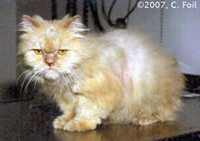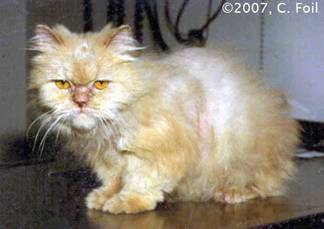
Carol Foil photo

Photo by Dr. Carol Foil
This Persian cat has a skin infection caused by the fungus
Microsporum canis, commonly known as ringworm. A popular topical treatment in Canada for ringworm in cats and other animals recently became unavailable because of an expired distribution agreement.
A topical medication that Canadian veterinarians for years regarded as a go-to treatment for ringworm and other fungal and yeast skin infections in pets is no longer available in the country, a consequence of the product's change in owners.
Imaverol, the brand name for enilconazole, was acquired in 2018 by Laboratoires Audevard, a veterinary pharmaceutical company in France, from the animal health drug giant Elanco. According to representatives of the companies, Elanco had, for a time, continued to distribute Imaverol in Canada — but no longer.
"That distribution agreement has just recently expired, and Elanco no longer has any product ...." Elanco spokesperson Keri McGrath told the VIN News Service by email.
Dr. Stephanie Chapman, Audevard's international veterinary technical adviser, said the company recently finalized an arrangement to take over distribution of Imaverol in European countries and has just begun examining the situation elsewhere, including in Canada. "[W]e are unsure as to if and when the product will be available again," Chapman said by email.
She added that discussions are ongoing with Elanco about the distribution of Imaverol in Canada but had no further details. "We would be happy to provide you with more information in early 2021 if you are still interested at that time," Chapman said.
Labeled for use in horses and dogs, Imaverol, an antifungal dip, has been used extensively in cats, as well, to treat ringworm, or dermatophytosis, said Dr. Jangi Bajwa, a veterinary dermatologist in British Columbia. He called the drug "the most reliable topical antifungal for feline dermatophytosis." Ringworm is the most common superficial fungal skin infection in cats, according to Bajwa. The infection can be contracted by people, as well.
Combined with decontaminating the household to rid it of fungal spores and the possible use of oral antifungal medication, Imaverol had been a "preferred treatment, due to its efficacy and safety," Bajwa said.
It was especially handy for treating cats, he said, because alternative products come in shampoo form, which are impractical to use on felines.
"Anything wet, cats don't like," Bajwa pointed out. Although Imaverol is a concentrated solution that is diluted with water, it can be applied in a sponge bath — a form of wet that cats are more apt to tolerate.
For that matter, it is handy for dogs, too, and not just for its labeled use, according to Dr. Nancy Waddell, a small and mixed animal veterinarian in Ontario.
While she's used Imaverol for years to successfully treat ringworm in cattle, horses, dogs, cats and guinea pigs, Waddell said by email, "[t]he other and more common use for Imaverol that I have done has been for the treatment of chronic skin issues (yeast) in dogs."
The product can be used as a foot soak or applied with a spray bottle and used daily to weekly on skin conditions, she said, calling the medicine "a gem."
"As most of these yeasty dogs are affected in areas that hold moisture, like the feet and armpits and groin, they are very difficult to treat and most clients do not want to bathe their pets daily," she elaborated. "Used as a spray, it allowed the client to spray the underside of the feet and between the toes and armpits or ventral belly or groin, wherever the patient had the yeast overgrowth. This could be done easily without need to rinse off and could be directed at the target areas daily and weekly for maintenance. ..."
Explaining her disappointment in losing access to the product, Waddell said, "The spray was my go-to treatment that allowed almost 90% of these clients to manage these dogs without the need for systemic (oral) antifungals, which are both expensive and hard for the dog to metabolize long-term."
Waddell-Parks said owners likely will be less compliant with using antifungal shampoos. "These have to be in contact with the skin for 10 minutes minimum to kill the organisms, and the areas have to be washed off and dried after treatment. Many pets resent having their feet touched to start with or are not great with baths, so the success rate of this type of treatment will be much lower ..." she said.
Bajwa said another dip useful for skin conditions in pets is lime sulfur; it is used by veterinarians to treat ringworm in the United States, where Imaverol is not sold. However, lime sulfur is largely unavailable in Canada, he said.
"I foresee having to use more oral antifungal drugs than I have had to use in the past ..." Bajwa said. "The landscape has changed ... thus, we will need to adapt to using what is available."